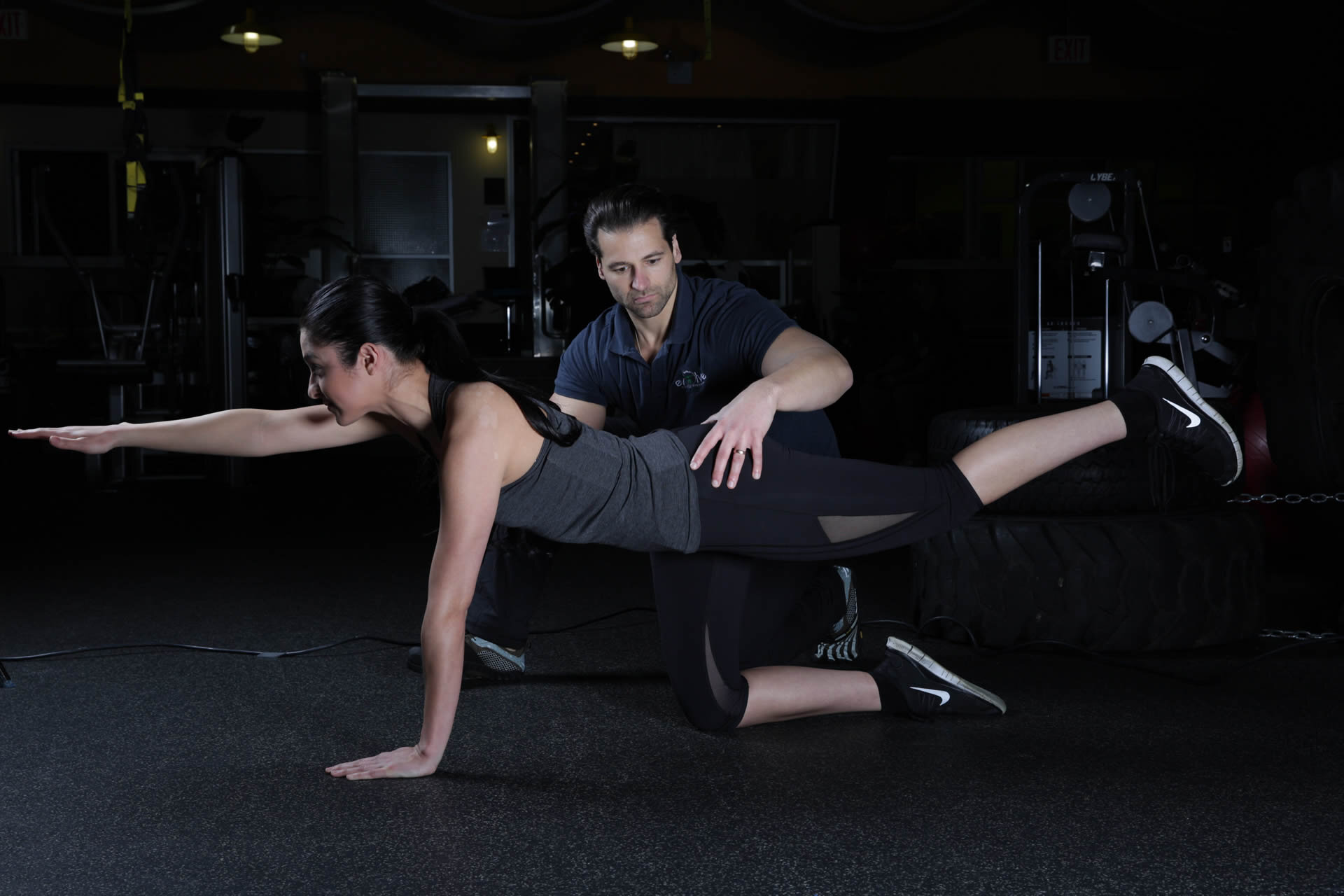
Physical Therapy for Spinal Cord Injuries
AT EVOLVE
Physical Therapy for Spinal Cord Injuries
HOW CAN PHYSICAL THERAPY HELP ME RECOVER FROM A SPINAL CORD INJURY?
A spinal cord injury can be a devastating injury. One of the most important aspects of recovering from a spinal cord injury, however, is intensive rehabilitation. Physical therapy to help maximize motor function, to restore functional mobility and to learn how to move and function in a changed body are all important aspects of physical therapy. Additionally, individuals living with a spinal cord injury are susceptible to developing pain or injury to their shoulders and arms, back and even legs and can benefit from physical therapy to help prevent and treat these conditions.
WHAT DOES PHYSICAL THERAPY FOR A SPINAL CORD INJURY LOOK LIKE?
Physical therapy for a spinal cord injury (SCI) is typically focused on both compensation for and recovery of function that has been lost. My team of therapists and I will always start by getting to know your concerns and goals and performing a thorough physical exam to evaluate your capabilities and any areas of concern you may be having. We will interview you about the equipment you have in your home, any complications you may have developed from the SCI, and any areas of pain or discomfort you may have. We will then create an individualized program to help meet your needs.
WHAT IS A SPINAL CORD INJURY?
Spinal cord injury is a broad term encapsulating all conditions involving damage to the spinal cord, the long bundle of nerves that carries signals between the brain, brainstem and the rest of the body. Almost all bodily functions are controlled by the nerves traveling through the spinal cord. When it is damaged, the efficacy of those nerve signals becomes impaired or completely interrupted, causing changes in sensation and motor function below the level of the injury.
The spine is divided into five segments, the cervical spine (neck), thoracic spine (mid back), the lumbar spine (low back), the sacrum and the coccyx. In between each of the vertebrae in the neck, mid back and lower back is an intervertebral disc that acts as a cushion, spacer, and shock absorber. A large hole, or foramina, in each vertebrae creates the spinal canal which houses the spinal cord. Smaller foramina between adjacent vertebrae act as portals through which spinal nerves exit from the spinal canal and travel out to the skin, bones, joints, muscles and organs.
A spinal cord injury can happen at any level of the spinal cord. If the spinal cord is injured in the neck area, effects will (most often) be seen in all four limbs and the trunk, this is called quadriplegia or tetraplegia. If the injury occurs in the thoracic or lumbar region then the arms will remain healthy while the trunk and/or lower body is affected. This is called paraplegia.
Spinal cord injuries can also be categorized as complete and incomplete based on the preservation in some of the lowest sacral nerve roots that are responsible for sensation and motor function in the area of the genitalia. Knowing the level of your injury and whether it is complete or incomplete helps with treatment planning and prognostication of future recovery.
Intervertebral discs are made up of a gelatinous center called the nucleus pulposus surrounded by a strong, fibrous outer layer called the annulus fibrosus. When excess pressure or strain is applied to the spine the annulus fibrosus can tear which allows the central nucleus pulposus to extrude out the opening. This is called a disc herniation. The bulging disc can then place pressure on the delicate nerves. Disc herniations sometimes occur acutely as a result of a sudden force applied to the spine such as lifting something heavy with poor body mechanics. It can also occur as a result of slow degeneration or tearing of the annulus over time such as can happen after years of standing or sitting with poor posture.
WHAT ARE THE SYMPTOMS AND IMPLICATIONS OF A SPINAL CORD INJURY?
The symptoms and implications of a spinal cord injury depend greatly on the location and severity of the injury but in general, a person with a spinal cord injury may experience some or all of these symptoms:- Muscle weakness or paralysis in the arms, trunk or legs.
- Diminished or complete loss of sensation in the affected areas.
- Nerve pain.
- Spasticity or changes in muscle tone.
- Difficulty or inability to stand and walk.
- Difficulty using arms for functional tasks.
- Impaired breathing or inability to breathe on one’s own.
- Changes in bowel and bladder function.
- Impaired balance
- Difficulty or inability transferring oneself from one surface to another.
Depending on the level and severity of the spinal cord injury and access to rehabilitation and medical treatment, recovery can vary from minimal to full recovery of lost function.
Call to Schedule a Consultation! 1-718-258-3300End Injury Progression
Physical therapy for spinal cord injuries has proven to slow and even stop back pain issues and injury progression in many cases.
Relieve Pain
The movements used in this technique can target your lower back, upper back, hips, shoulders, and neck helping you to manage pain during the course of your physical therapy treatments.
Improve Range of Motion
Posture awareness is an important area to focus on due to the fact that certain positions may cause you further back pain.
Restore Mobility
You can gain mobility and flexibility by taking part in the stretches and exercises as prescribed by your physical therapist.
How Long Will Spinal Cord Injury Physical Therapy Treatments Last?
If you decide to work with a physical therapist to help with your spinal cord injury issues, your entire treatment plan could consist of around 8-20+ different physical therapy for back pain sessions that will each last 60-90 minutes. Once you complete your customized back pain physical therapy treatment plan, you will be able to continue to do the prescribed stretches and exercises utilized during your back pain PT sessions yet in the comfort of your own home.
HOW DOES PHYSICAL THERAPY ADDRESS SIGNS/SYMPTOMS OF A SPINAL CORD INJURY?
While each case is different, there are many ways that physical therapists can help those living with a SCI. Here are some of the tools that physical therapists have to treat SCI:
- Use neuromuscular electrical stimulation to stimulate motor nerves to contract muscles and help with motor recovery
- Prescribe strength and flexibility exercises to maximize your ability to use the affected and unaffected body areas
- Teach you how to move safely and with the best mechanics to minimize risk of complications like pressure ulcers, contractures, falls and orthopedic injuries like chronic shoulder pain
- Help improve trunk strength and breathing
- Address fine motor impairments in the hands
- Work on sitting and, when appropriate, standing balance
- Teach you how to move around independently or with greater independence in the bed and transfer between surfaces like your chair and the car.
- Prescribe high intensity gait training to improve walking ability
- Evaluate the need for and make recommendations on adaptive equipment
- Evaluate the need for and make recommendations on braces and orthoses
Additionally, if you are dealing with any other injuries like shoulder pain or back pain, for example, physical therapy to improve your symptoms and address the underlying causes is vitally important.
So, whether you have been living with a spinal cord injury for years and are looking for help to address a specific concern or have recently been injured and are wanting to maximize your recovery, call us today to learn more about our services and schedule an evaluation:
Mill Basin (located in Harbor Fitness)
6161 Strickland Ave
Brooklyn, NY 11234
Monday: 7am-8pm
Tuesday: 7am-8pm
Wednesday: 8am-5pm
Thursday: 7am-8pm
Friday: 8am-1pm
Park Slope (located in Harbor Fitness)
550 5th Ave.
Brooklyn, NY 11215
Monday: 9am-8pm
Tuesday: 8am-6pm
Wednesday: 9am-8pm
Thursday: 8am-6pm
Friday: 8am-3pm
Gravesend
372 Avenue U
Brooklyn, NY 11223
Monday-Thursday: 8am-8pm
Friday: 8am-3pm
Midwood
945 Kings Highway
Brooklyn, NY 11223
Monday-Thursday: 12pm-8pm
Ready to take the next step to a healthier you?
Contact Us Today!
PHYSICAL THERAPY FOR SPINAL CORD INJURIES AT EVOLVE!
Need Physical Therapy for a Spinal Cord Injury?
Let our caring and compassionate physical therapists help you with relieving pain while getting you back on your feet comfortably.
Call now to schedule your first PT consultation free of charge.
Call: 1-718-395-6551







